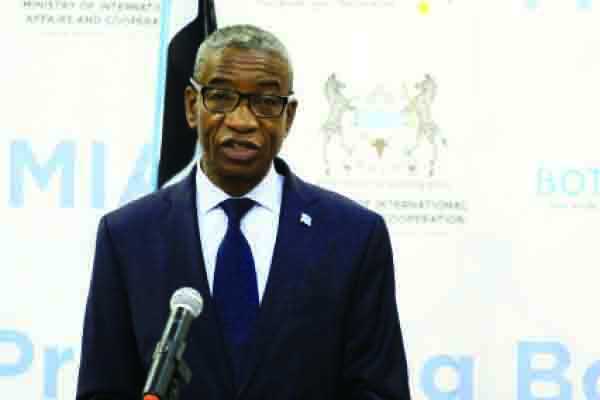Corruption, maladministration brings misery to Africa
Presidential Affairs minister Nonofo Molefhi has said that corruption and maladministration should be fought and shunned. Addressing Southern Africa ombudsman in Gaborone this week Molefhi said the list of miseries corruption and maladministration bring to people are inexhaustible.
“The two are cancerous tumours on the economy and governance of any nation,” said Molefhi at the African Ombudsman and Mediators Association (AOMA) for Southern Africa member states conference. He said the two plagues undermine the health, wealth and future of any country. “Their effects are poor service delivery, poor health services, poor education, poor quality infrastructure and an increase in poverty levels,” said Molefhe, adding that corruption and maladministration must be fought tirelessly. He bemoaned that Africa, a continent that abounds with natural resources, more than any other, finds itself in a developmental predicament emanating from corruption, maladministration and impropriety.
“It is now on record, that underlying the litany of Africa’s development problems is a crisis of governance that manifests itself in corruption and maladministration.” He said the two are inseparable bedfellows in that maladministration is the breeding ground for corruption, while corruption is a form of gross maladministration. Molefhi challenged the region’s ombudsman to remain steadfast in discharging their duties amid challenges they may face in fighting corruption and maladministration.
“You are the last bastion of hope for the voiceless and downtrodden whose rights have been trampled on by the ever so powerful government machinery. You bridge the gap between the governed and those who govern by holding public administration to account for its decisions and actions,” said Molefhi.
The AOMA regional meeting composed of Angola, Botswana, Lesetho, Malawi, Mozambique, Namibia, South Africa, Zambia and Zimbabwe was held under the theme: ‘Re-energising the Ombudsman Institution in Southern Africa.’ AOMA is the umbrella organisation for ombudsman and mediators with a membership of 46 institutions across six regions – North Africa, Southern Africa, West Africa, East Africa, Central Africa and the Indian Ocean Region.South Africa’s public protector Advocate Busisiwe Mkhwebane, who is also President of AOMA, said the ombudsman grapple with issues of independence and autonomy, security of tenure for heads of such institutions, insufficient resources, poor accessibility and impartiality.
She said theirs is not an easy task and will continue to be punctuated by challenges. “We will face untold difficulties including resistance, lack of political will and resource-constraints among other things, leading to this drop of energy levels. However we should not despair,” said Mkhwebane who is facing a barrel of accusations and is being threatened with removal from office as a public protector.
Sharing her sentiments, Florence Kajuju, AOMA secretary general said: “We in Africa and at a regional level face a unique set of challenges for which we must continually reposition and engage stakeholders, including regional bodies in order to add value to Africa’s governance and renaissance.”
The 10th edition of the Global Corruption Barometer (GCB) – Africa, by Transparency International reveals that while most people in Africa feel corruption increased in their countries, a majority also feel optimistic that they, as citizens, can make a difference in the fight against corruption.






